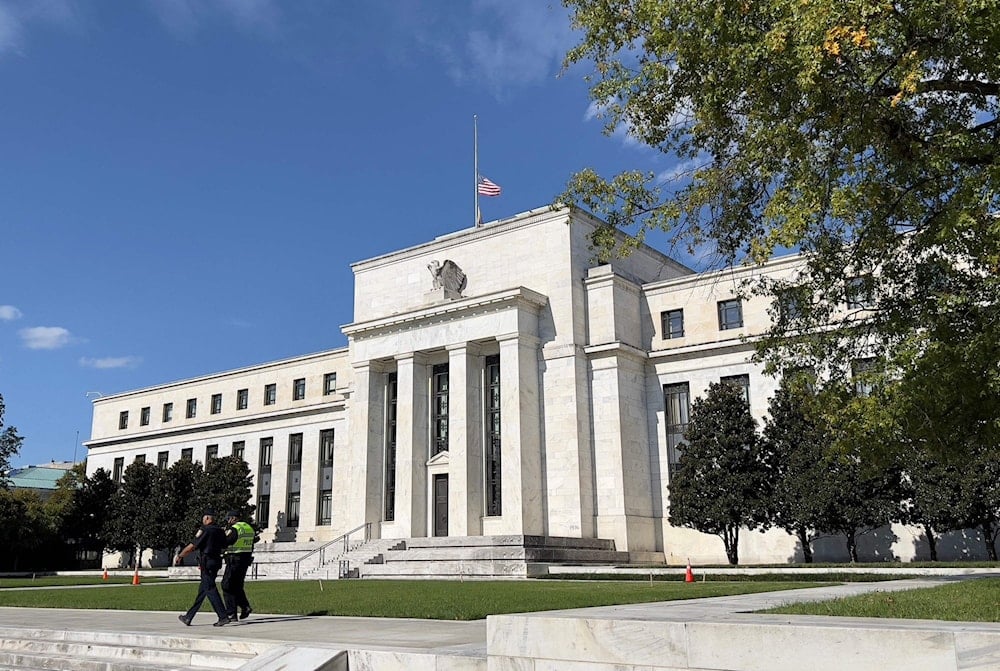Delinquency rates on loans in US highest in 5 years, sparks concerns
A senior official at the US Federal Reserve says that banks have heightened their reserves for potential loan losses in response to the escalating delinquency rates.
-

The US Federal Reserve building in Washington, DC, United States, October 22, 2021 (AFP)
The financial system of the United States is encountering a significant rise in delinquency rates across various sectors, Michael Barr, the vice chairman of the Federal Reserve for Supervision, has said in a House committee hearing.
Commercial real estate loans, which are loans taken out by businesses to purchase or develop properties for commercial use, are experiencing their highest delinquency rates in five years, he continued.
"For example, delinquency rates are rising among certain commercial real estate (CRE) loans, such as those backed by offices, and some consumer loan sectors. CRE delinquencies are now at a five-year high. Credit card and auto loan delinquencies have been rising."
Read more: US debt to grow $5bln per day for next ten years: Bank of America
Banks have heightened their reserves for potential loan losses as a reaction to the escalating delinquency rates, he added. "The banking sector as a whole should be prepared to absorb loan losses that may materialize and continue fulfilling its vital role providing credit to households and businesses."
Increasing capital
US regulators are also considering bolstering the capital requirements for financial institutions as a buffer against potential losses from loans and investments stemming from stress scenarios, according to Barr.
"A safe and sound banking system is critical to a healthy economy, and capital is foundational to safety and soundness. Well-capitalized banks have more capacity to support the economy by continuing to lend to households and businesses through stressful conditions ... This brings me to the agencies' proposal to enhance capital requirements."
Read more: Banking giant Citigroup announces major layoffs
The US Federal Reserve for Supervision has received significant feedback on the proposal to strengthen capital requirements, the financial official said. This feedback is undergoing thorough examination with the aim of achieving widespread agreement in advancing the proposal, he concluded.
Skyrocketing national debt
Several American banks collapsed last year, leading to direct government intervention to contain more failures in the financial system.
In Monetary Tightening and US Bank Fragility in 2023, researchers found that "there are 186 banks with a negative insured deposit coverage ratio," which suggested, according to the study, that these banks "are certainly at a potential risk of a run, absent other government intervention or recapitalization.”
A survey conducted in January revealed that American CEOs consider the US' inflating national debt as the most worrisome geopolitical risk that could affect their business, rather than wars in the Middle East and Ukraine.
The survey, taken by CEOs and C-Suite executives, called The Conference Board’s C-Suite Outlook 2024, showed that the US national debt skyrocketing to over $34 trillion in a historic high at the end of the fourth quarter of 2023 marked a new era of national and global economic inflation CEOs and C-Suite executives have not prepared for.
It found that only 37% of US national CEOs and 27% of global CEOs are economically capable of facing a recession.
Federal Reserve Chairman Jerome Powell stated in December that while the current status of the US economy doesn't suggest a recession, uncertainties regarding growth and inflation make future developments unpredictable.
He further emphasized then that a recession within the next year is a possibility, though not guaranteed, and there are ongoing risks.
Read more: Fitch downgrades US credit rating, sparks fears over treasury issuance

 4 Min Read
4 Min Read








